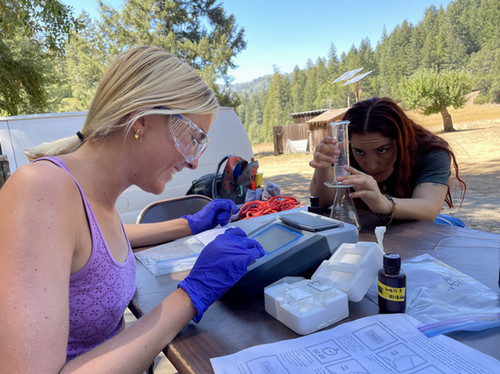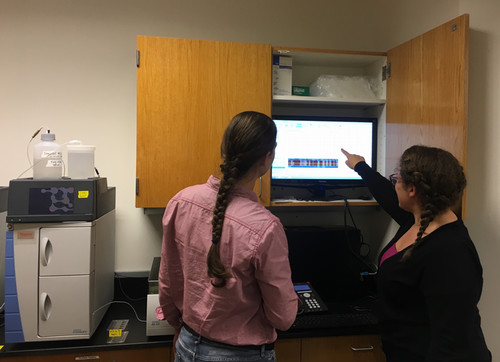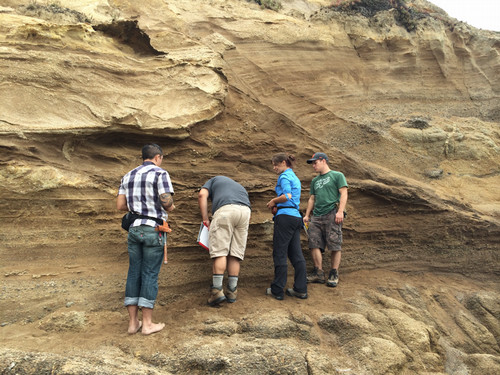Support Page Content
Graduate Program
About the Geology Graduate Program
The Sacramento State Master of Science in Geology is a part-time or full-time program that equips students with the skills they need to become leaders in their field. Advanced training prepares graduates to enter careers or doctoral programs that require cutting-edge knowledge and hands-on experience in topics such as tectonics, hydrogeology, environmental geology, or geologic hazards.
The Sacramento State Geology Department does not offer PhD degrees.

Work while you earn your degree!
Our program is designed to allow students to work while pursuing their degree. Courses typically meet once per week in the evening starting at 5:30 pm.
Skills you can develop in the program:
- Python coding
- Drone mapping
- InSAR
- GNSS (GPS surveying)
- 3-D mapping
- Structure from motion
- Aquifer testing
- Borehole geophysics
- Water sampling
- MODFLOW modeling
- Critical thinking
- Project management
- Troubleshooting
- Science communication
Get internships that lead to careers
Our location in the state capital provides access to many environmental and geotechnical consulting companies as well as local, federal, and state agencies such as the California Geological Survey, Department of Water Resources, State and Regional Water Resources Control Boards, and the US Geological Survey California Water Science Center located upstairs in our building. Student internships in these organizations often lead to careers!

Program Description
The degree has two formats: 1) the thesis track and 2) the non-thesis track (see descriptions below and course requirements in the catalog). All students are admitted to the M.S. in Geology program under the non-thesis track. Transitioning to the Thesis track requires a M.S. Thesis Proposal that is approved by a faculty advisor and two other committee members.
1) Thesis track
Description: Students complete 24 units of coursework and 6 units of Master’s Thesis. The culminating experience is a Master’s Thesis: an independent research project that generates new scientific knowledge. The thesis enables the student to develop expertise in their specific topic. Completing a thesis project can benefit students in all careers because it promotes the development of many transferrable skills, including: critical thinking, troubleshooting, project management, and scientific communication. The thesis project is guided by a faculty advisor and two additional committee members.
Typical time to degree: 2-3 years.
2) Non-thesis track
Description: Students complete 30 units of coursework. The culminating experience is a comprehensive exam to demonstrate mastery of topics covered by courses taken during the program.
Typical time to degree: 2-2.5 years. 2.5 years if student takes 2 courses (6 units) per semester.
Examples of past master’s thesis topics:
- Modeling to determine controls on arsenic release into groundwater in the Central Valley
- Spawning Habitat Evaluation in the Low Flow Channel of the Feather River
- Pressure-time-temperature record of Cretaceous–Paleocene exhumation of the Salinian Block
- Geophysical evidence for upward displacement of deep saline groundwater caused by water injection in North Coles Levee oil field
Funding
Graduate students often support their studies through paid internships with state or federal agencies or consulting companies.
Teaching Assistantships in the Geology Department are available on a limited basis.
For the thesis-track, funding varies by project and advisor. Applicants are encouraged to contact prospective thesis advisors to inquire about funding.
Applying to the Program
Still accepting applications for Fall 2025 admission! Email geologygraduatecoordinator@csus.edu for a late application code.
Fall applications due:
February 1st (priority deadline)
March 1st (final deadline)
Spring applications due September 15th.

Review of applications for Fall admission will happen on a rolling basis starting February 1st until the final deadline of March 1st.
Application process:
- If you are interested in pursuing a thesis, contact faculty members with similar research interests to inquire about opportunities in their research groups prior to submitting an application to the program (see faculty research interests and webpage links here). Students are not guaranteed a position in a research group unless both the student and faculty member have signed the Thesis Advisor Contract. A general statement that a faculty member is accepting students does not constitute a commitment on the part of the faculty member. If you intend to pursue the non-thesis track, skip to step 2.
- Start your CalStateApply application as it contains information about how to complete the rest of the application process.
- In CalStateApply, add information for 3 recommenders who are familiar with your academic record and professional capabilities. Once each Recommendation Request is saved, the system will automatically send an email to that recommender requesting they upload a letter of recommendation. We recommend you do this early as it often takes time for recommenders to submit their letters. We will accept letters past the Feb 1 priority deadline, but it does slow down our review of your application.
- In CalStateApply, upload unofficial transcripts from all institutions attended.
- In CalStateApply, upload a statement of interest. This should be no more than one page single-spaced in length and include:
- Your career goals.
- How graduate school will help you achieve those goals.
- What experiences beyond your undergraduate degree have prepared you for graduate school? (e.g. research, professional, internships, etc.)
- Why are you interested in attending the MS in Geology program at Sacramento State (as opposed to other schools)?
- If you would like to pursue a thesis, include the name of the faculty member(s) with whom you would like to work and potential thesis projects. Contact those faculty members ahead of time to inquire about opportunities in their research groups.
- What unique perspective do you bring to the program?
Note: Students are not guaranteed a spot in a research group unless the faculty member has stated in writing that they will take them on as a student. A general statement that a faculty member is accepting students does not constitute a commitment on the part of the faculty member.
Also, all students are admitted to the M.S. in Geology program under the non-thesis track. Transitioning to the Thesis track requires a M.S. Thesis Proposal that is approved by a faculty advisor and two other committee members.

Program eligibility
To be eligible for the program, students must meet the admission requirements listed in the catalog and summarized below. However, students missing a few of the required courses are still encouraged to apply and may be admitted with "conditionally classified” status. These missing courses must be taken in the first year of the program and do not count toward the graduate degree.
To be eligible for the program, students must have:
- a degree in Geology or 24 units of upper division geology coursework as listed in the catalog
- a minimum 3.0 GPA in upper division Geology courses
- two semesters of inorganic Chemistry with a lab (CHEM 1A and CHEM 1B or equivalent)
- two semesters of Physics with a lab (PHYS 11A and PHYS 11B or PHYS 5A and PHYS 5B or equivalent)
- two semesters of Calculus (MATH 30 and MATH 31 or equivalent)
Students missing some of these required courses are still encouraged to apply (see above).
International applicants
International applicants are strongly advised to review the Required Documents needed before submitting their application. This information can be found on the International Admissions page.
In particular, see the:
- Financial Affidavit form
- Financial Statement. This shows the Graduate Programs minimum USD proof of funds required for an I-20 visa to be issued.
Questions?
If you have any questions about the Geology Graduate Program or application process, please email GeologyGraduateCoordinator@csus.edu.